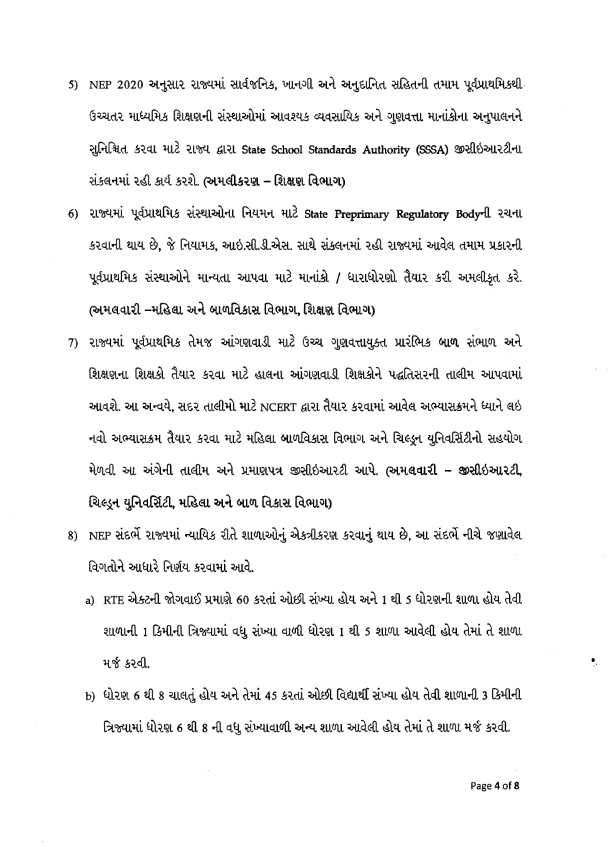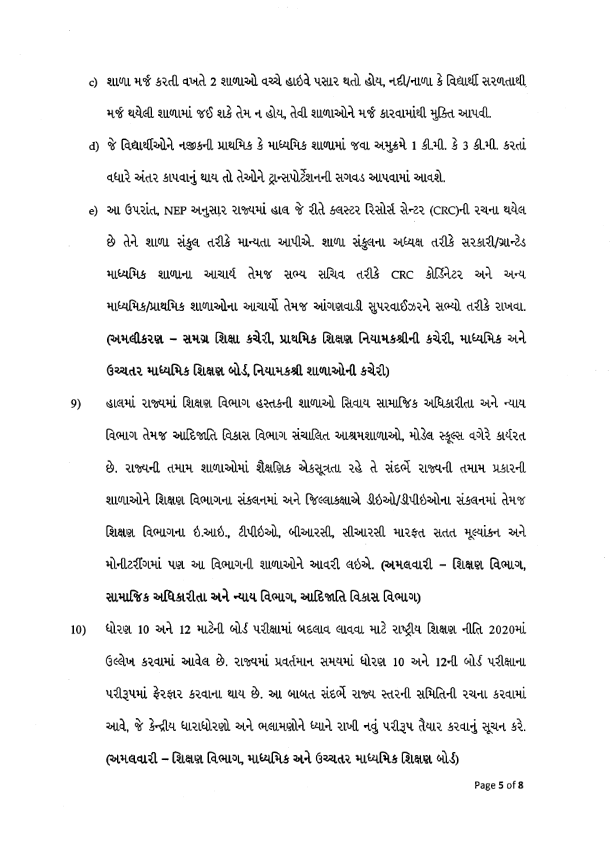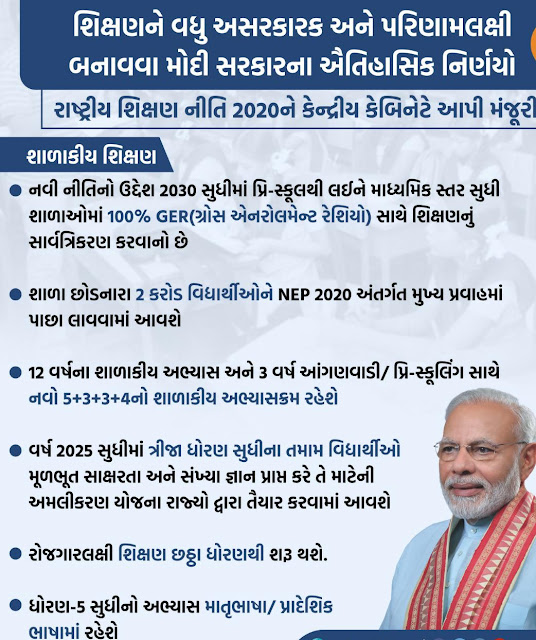The Modi government of the Center has approved the new education policy. National Education Policy 2021 School Education - Task Force Committee Meeting. With this, the Ministry of Human Resource Development has been renamed as the Ministry of Education. Under the new education policy, the format of 10 + 2 has been completely abolished, understand this.
Now it is divided into 10 + 2 and 5 + 3 + 3 + 4 format. This means that now the first five years of school will include three years of pre-primary school and foundation stage including class 1 and class 2. Then the next three years will be divided into the preparation phase of classes 3 to 5.
Now it is divided into 10 + 2 and 5 + 3 + 3 + 4 format. This means that now the first five years of school will include three years of pre-primary school and foundation stage including class 1 and class 2. Then the next three years will be divided into the preparation phase of classes 3 to 5.
💥🆕રમત ગમત સાધનો ની ખરીદી બાબત વર્ષ ગ્રાન્ટ પરિપત્ર -2021-22
▪️પ્રાથમિક શાળા - ૫૦૦૦
▪️ઉચ્ચતર પ્રાથમિક શાળા - ૧૦૦૦૦
▪️માધ્યમિક શાળા - ૨૫૦૦૦
▪️ઉચ્ચતર માધ્યમિક શાળા - ૨૫૦૦૦
▪️કયા સાધનો ખરીદવાના રેહશે, વિગતવાર માહિતી માટે 👉 અહીં ક્લિક કરો
નોંધ:: ઉપરોક્ત પરિપત્ર માત્ર જાણકારી માટે જ છે. તે અમને વોટ્સએપના માધ્યમથી મળેલ છે. જેનું અમે સમર્થન નથી કરતા જેની નોંધ લેશો
After this, three years of middle stage (classes 6 to 8) and four years of secondary stage (classes 9 to 12). Apart from this, there will be no strict adherence to arts, commerce, science stream in schools, students can take whatever courses they want now.
Some points of the new education policy
Emphasis on making teachers aware as well as teachers.
-Promoting the abilities of each student will be a priority.
- Emphasis will be on conceptual understanding, will lead to creativity and critical thinking.
There will be no difficulty, separation between art and science for students.
Ethics, constitutional values will be the major part of the curriculum.
Ethics, constitutional values will be the major part of the curriculum.
(1) The policy, which covers the age of 3 to 18 years as per NEP 2020, recommends an innovative 5 + 3 + 3 + 4 educational and curriculum-related structure by changing the existing structure of school education of 10 + 2.
In this regard, it is suggested to accept the innovative structures suggested by the Task Force Committee. Hence, the decision is taken to implement the following school structure in the state. The school structure proposed in the National Education Policy 2020 will be 5 + 3 + 3 + 4, in which, ...
a) 3 years of pre-primary in 5 years and standard 1 and 2 (basic education)
b) 5 years Std. 5 to 5 elementary education)
c) 5 years Std. 6 to 8 (Higher Primary Education)
d) 4 years Std. 9 to 12 Secondary Education), Implementation - Education Department)
(2) The above points (1)
(a) In this regard, according to the school structure 5 + 3 + 3 + 4 ... a) In the basic phase of the first five years (i.e. from 3+ years of age of the child) the first two years will be in Anganwadi / Pre-Primary,
b) When the next year (from 5+ years of age of the child) to the year before Std. 1) will be known as 'Kindergarten'. This is when the standard will be started from the age of 6+ years of the child.
c) This structure will be implemented from the academic year 2021-22. e) To ensure admission of children who have completed 3 years to get admission in pre-primary / Anganwadi. Along with this, the Anganwadi system should also be set up in the ashram schools located in the tribal areas of the state.
(Implementation - Education Department, Women, and Child Development Department, Tribal Development Department)
(3) The kindergarten should be designed as part of the primary school on the school premises.
a) Kindergarten children will be given activities like Pragya approach like Std. 1 and 2.
b) Contract-based recruitment will be done by outsourcing by Gujarat Primary Education Council as per the requirement of staff for kindergarten.
c) At least PTC / D.EL.Ed of the teacher appointed in the kindergarten. Should be qualified. (Implementation - Education Department, Women, and Child Development Department, Overall Education Office)
(4) With reference to the above issue (I) (d), at present in the state, Std. Higher Secondary Education - Instead of two parts, four consecutive years should be done for Std. 9th to 12th. Implementation - Department of Education, Board of Secondary and Higher Secondary Education)
(5) From all pre-primary including public, private, and grant-aided in the state as per NEP 2020. The State School Standards Authority (SSA) will work in coordination with GCERT by the state to ensure compliance with the required professional and quality standards in institutions of higher secondary education.
(Implementation - Education Department)
(6) The State Preprimary Regulatory Body is to be constituted for the regulation of pre-primary bodies in the State. To prepare and implement standards/norms for accreditation of all types of pre-primary institutions in the state.
(Implementation: Women and Child Development Department, Education Department)
(7). The existing Anganwadi teachers will be given systematic training to prepare high-quality elementary child care and education teachers for pre-primary as well as Anganwadi in the state. Accordingly, GCERT provides training and certification in this regard in collaboration with the Department of Women and Child Development and Children's University to prepare a new syllabus considering the syllabus prepared by NCERT for the above training.
(Implementation - GCERT, Children's University, Department of Women and Child Development)
(8). With regard to NEP, the state has to judicially consolidate schools. The decision in this regard should be based on the following details.
a) As per the provisions of the RTE Act, a school with less than 60 numbers and a standard 1 to 5 school within a radius of 1 km of a school having 1 to 5 standard schools should be merged.
b) Merge a school with a standard of 6 to 8 running and a school with less than 45 students within a 3 km radius of another school with a higher number of standard 6 to 8.
c) Exemption from merging schools where a highway passes between 2 schools at the time of school merger, river/ditch, or where the student cannot easily go to the merged school.
d) Students who have to travel 1 km to the nearest primary or secondary school. Or 3 km. They will be provided transportation if they have to cover a distance of more than Rs.
e) In addition, the way the cluster resource center (CRC) is currently set up in the state as per NEP should be recognized as a school complex. To keep the Principal of Government / Granted Secondary School as the Chairman of the School Complex as well as the CRC Coordinator as the Member Secretary and the Principals of other Secondary / Primary Schools as well as the Anganwadi Supervisor as members.
(Implementation - Overall Education Office, Office of the Director of Primary Education, Board of Secondary and Higher Secondary Education, Office of the Director of Schools)
(9). Apart from the schools run by the education department, there are ashram schools, model schools, etc. run by the social empowerment and justice department as well as the tribal development department. In order to maintain educational uniformity in all the schools of the state, all types of schools in the state should be included in the coordination of the education department and at the district level in the coordination of DEO / DPEO as well as EI of the education department. , Also cover the schools of this department in continuous evaluation and monitoring through TPEO, BRC, CRC.
(Implementation - Department of Education, Department of Social Empowerment and Justice, Department of Tribal Development)
(10) Mention is made in the National Education Policy 2020 to bring changes in the board examinations for Std. 10 and 12. At present in the state, the standard of board examination of standards 10 and 12 has to be changed. A state-level committee should be constituted in this regard, which would suggest a new model keeping in view the central norms and recommendations.
(Implementation - Department of Education, Board of Secondary and Higher Secondary Education)
(11) Inclusion of Gujarati language and mathematics as a standard language in Std. 1 in the state at present. Has been. According to the implementation of the trilingual formula outlined in NEP 2020, English subjects should be introduced as Introductory English along with the Gujarati language from Std. The English language taught during standards 1 to 3 will not be a part of that standard examination. English subject will be part of the examination in standard 4 and above.
(Implementation - Education Department, GCERT, Office of the Director of Primary Education)
(12) Merit list is prepared for the recruitment of teachers in primary to higher secondary schools in the state with the marks of TET / TAT examination along with the marks of undergraduate, postgraduate level Regarding NEP 2020, from now on, for the recruitment of teachers in primary to higher secondary schools, a 6-level selection process of candidates with graduate, post-graduate marks as well as TET / TAT examination marks will be organized, which will include tests, interviews and classroom process demonstrations. As well as all three-level marks. Added merit will be prepared.
(Implementation - Education Department)
(13) With regard to NEP 2020, state teachers are required to conduct at least 50 hours of training courses for Continuous Professional Development (PD) every year for their professional development. The teacher of this research. The training to be completed by them as well as the vocational courses should be recorded in their service book and should be linked with the norms for their higher pay scale.
(Implementation - Department of Education, Office of the Director of Primary Education, Board of Secondary and Higher Secondary Education, Office of the Director of Schools, GCERT)
(14) At the end of Std. 3, 5, and 8, for children, like Std. Accordingly, the responsibility for conducting examinations at the end of Std. 3, 5, and 8 should be given to the State Examination Board, Gandhinagar under the coordination of GCERT as well as Gujarat Board of Secondary and Higher Secondary Education. Dt. Regarding the resolution of 12/02/2020, students of all government and private schools will take part in this common examination.
(Implementation - State Examination Board)
Some other important aspects of the new education policy
By 2040, all higher education institutions will have to create a multi-subject institution with more than 3000 students.
By 2030, there will be at least one major multi-subject high establishment in or near every district.
- The syllabus of institutions will be such that emphasis should be laid on the development of public institutions.
- Institutions will have the option to run open distance learning and online programs.
-All the deemed universities created for higher education and the related university will be known only as universities.
- Aim to develop human, intellectual, social, physical, emotional, and moral capabilities in an integrated manner.
The new education policy will include music, philosophy, art, dance, theater, education courses of higher institutions. The bachelor's degree will be of 3 or 4 years duration. Academy Bank of Credit will be formed, digital records of students' performance will be collected. By 2050, at least 50 percent of the learners will have to be involved in vocational education through the school and higher education system. A new national research institute will be formed for quality qualification research, it will be related to all the universities of the country.
The Cabinet has given the green signal to the New Education Policy 2020. After 34 years the education policy has changed. Massive changes have been made from schooling to education level. Not only this, now the Ministry of Human Resource Development will also be known as the Ministry of Education.
Informing about the decisions taken in the cabinet meeting, Prakash Javadekar said that a new education policy of the 21st century has been approved. There has been no change in education policy for 34 years. Academics of the world will appreciate it.
Modi government announces new 21st-century education policy, renames MHRD
On the other hand, HRD Minister Ramesh Pokhriyal 'Nishank' said that this policy will pave an important way.
This is an important change
- Under the new education policy, students up to 5th standard will now be taught mother tongue, local language, and national language.
- The rest of the subject even if it is not English ... will be taught as one subject.
- Now only the 12th standard board exam has to be given, whereas before this 10th standard board exam was compulsory, which is no longer the case.
There will be examinations in the semester from 9th to 12th standard. School education will be taught under 5 + 3 + 3 + 4 formula.
- So, on the other hand, the college degree will be 3 and 4 years. That is, under graduation, you will get a certificate in the first year, a diploma in the second year, and a degree in the third year.
The name of the Ministry of Human Resource Development (MHRD) will now be the Ministry of Education. This decision has been taken in the meeting of the Modi Cabinet. Education Minister Ramesh Pokhriyal said in a press conference at the ministry today that the Ministry of Human Resource Development will now be known as the Ministry of Education.
At the same time, Modi has approved a new education policy in the cabinet meeting.
Information and Broadcasting Minister Prakash Javadekar said a new education policy for the 21st century has been approved. There has been no change in education policy for 34 years. Educators around the world will appreciate it.
The central government believes that large-scale change is needed in the education sector. So that India can become a superpower of knowledge in the world. This requires good quality education for all. So as to create a progressive and dynamic society.
New Education Policy 2020 In Gujarati Pdf 1:: Click Here
New Education Policy 2020 In Gujarati Pdf 1:: Click Here
The Ministry of Education is emphasizing developing a new national curriculum framework to improve the quality of education provided at the primary level. The framework will also cover knowledge of different languages, 21st-century skills, sports in the course, arts, and environmental issues.
The Ministry of Education is emphasizing developing a new national curriculum framework to improve the quality of education provided at the primary level. The framework will also cover knowledge of different languages, 21st-century skills, sports in the course, arts, and environmental issues.










